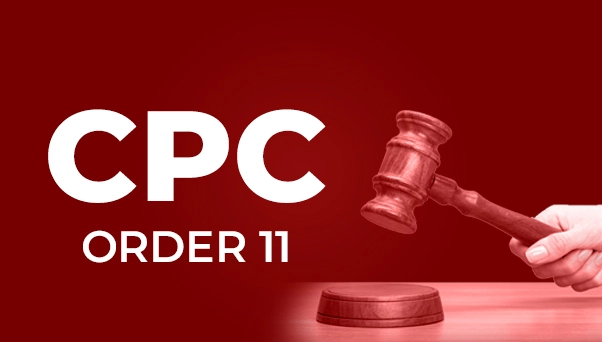India's Code of Civil Procedure from 1908 includes Order XI, often called "CPC Order 11." This order relates to the discovery and inspection process for documents in civil court cases. It enables one party to require the other side to disclose relevant documents. This ensures the court has all the important facts and evidence to reach a fair decision. CPC Order 11 establishes clear rules for making documents available during litigation. The goal is an equitable legal process where key information gets shared.
Background and Purpose
Order XI's discovery and inspection aims to ensure both parties in a legal case have access to pertinent documents either side possesses. Promoting openness, it aids in uncovering the truth, helping the court render fair judgments. The central tenet is that neither party should conceal evidence crucial to resolving the dispute. This process enables transparency and assists the pursuit of justice.
Key Provisions of Order 11
Order XI contains several rules outlining the process of discovery and inspection.
Rule 1 - Discovery by Interrogatories
This rule permits a party to deliver written interrogatories (a series of questions) to the other party, which are relevant to the matters at issue in the suit. The party receiving the interrogatories must respond under oath.
Rule 2 - Questions Must Stay Focused
Interrogatories should zero in on specific issues crucial to the case. Courts must approve these queries beforehand to verify their relevance.
Rule 3 - Responding Party Can Raise Concerns
The party required to provide discovery responses can object to interrogatories. Objections may arise due to irrelevance or if answering could unfairly harm or burden the party.
Rule 4 - Responding to Inquiries
If a party disagrees with specific questions, the court has the authority to disregard those inquiries or require responses, based on what is necessary for achieving fairness in the case.
Rule 5 - Sworn Statements for Answering Questions
Responses to the questions must be provided through an affidavit within 10 days or another timeframe set by the court. The answers should be thorough, while avoiding unnecessary objections.
Rule 6 - Affidavit Format Guidelines
Affidavits must follow specific formatting rules and provide comprehensive details as mandated by law. These requirements ensure clarity and adherence to legal standards set by the judicial system.
Rule 7 - Corporate Response Representative
In situations where a corporation is obligated to answer interrogatories, the individual designated to respond on the corporation's behalf requires court approval. This measure safeguards that the representative possesses the necessary knowledge to provide thorough and accurate responses.
Rule 8 explains how a party can raise objections to interrogatories. An affidavit must be submitted, clearly stating the grounds for objection, often citing irrelevance or excessive burden.
In Rule 9, if objections are deemed inadequate, the court holds authority to mandate full or partial responses. Furthermore, if existing answers are deemed insufficient, the court may require more comprehensive responses.
Rule 10 - Seeking Disclosure of Papers
This guideline allows one party to request the court order the opposing side to reveal documents under their control, which relate to the case's key points.
Rule 11 - Sworn Statement of Documents
Each side must submit an affidavit listing all papers they possess or can access, relevant to the proceeding's subject matter. It specifies documents they refuse to provide and explains why.
There are procedures for document sharing between parties in a legal matter.
Rule 12 deals with the need to reveal pertinent papers held by either side. This is achieved by submitting a sworn list detailing available documents tied to disputed issues.
Rule 13 covers the presentation of listed documents.
Upon court instruction, the disclosed documents must be furnished. The court then assesses their significance and need for the proceedings.
Rule 14 - Reviewing Papers Cited in Written Arguments or Sworn Statements
Both sides can look at documents referenced in the other side's legal filings or affidavits, unless those materials are confidential or unrelated to the case.
Rule 15 - Inspecting Disclosed Records
After exchanging documents, either party may formally request to examine the other side's disclosed records. Denying or failing to allow inspection can result in penalties, potentially making the document inadmissible as proof.
Rule 16 - Premature Discovery
The court has the authority to deny or control any requests for document sharing if it determines that the request is made too soon or if the sought documents lack sufficient details.
Rule 17 – Noncompliance without Reasonable Cause
If a party fails to follow a court order regarding document sharing without a valid reason, the court may impose penalties. These penalties could include dismissing the party's claim or defense.
Rule 18 - Using Documents
This rule governs how documents are utilized during trials or hearings. To be admissible as evidence, documents generally must be included in an affidavit of documents previously disclosed or produced during the discovery process.
These rules each serve a distinct purpose in ensuring a structured, orderly discovery and inspection process, promoting fairness and efficiency in legal proceedings. Examining these additional rules reveals the comprehensive procedural requirements and judicial discretion provisions outlined in Order 11 of the CPC.
Using the Rules
Order XI is essential for civil lawsuits, particularly when cases involve substantial paperwork. It narrows the focus, allowing trials to concentrate on relevant facts. This process conserves time and resources for courts and parties alike. The rules provide clarity, streamlining complex cases.
Conclusion
To summarize, CPC Order 11 establishes a systematic approach to document discovery and examination in civil cases. It fosters fairness and efficiency in the legal process. The Order aims to prevent "trial by ambush," where one party may be caught off guard at trial by documents or facts, they were unaware of be forehand. By mandating the disclosure of all relevant materials before trial, Order 11 contributes to more informed and equitable judgments.
